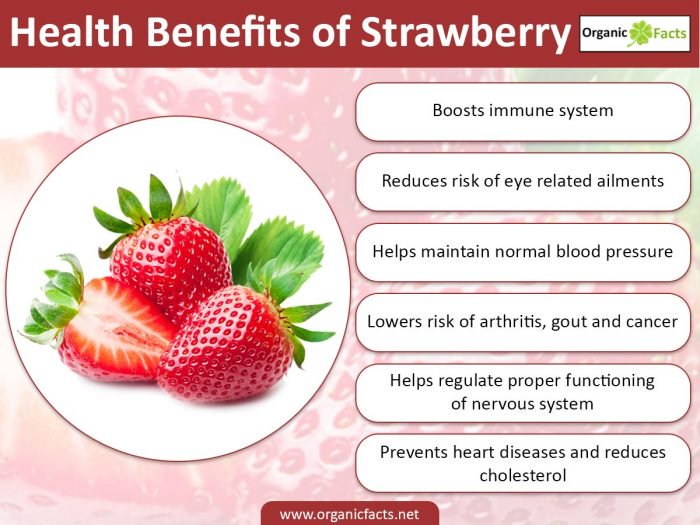The Benefits of Strawberries
Hi, so recently I started looking into the benefits of fruits and vegetables so here is the first one for the month of May so after seeing all the benefits you might want to eat plenty of Strawberries this summer.

The antioxidant-rich strawberries can help improve heart health, increase HDL (good) cholesterol levels, and lower your blood pressure. They can also help better your brain function, and enhance eye and skin health, arthritis, and gout. The polyphenolic content of strawberries makes them beneficial for improving the immune system, helping to prevent various types of cancers, and reduce the signs of premature aging.
What is Strawberry?
A strawberry (Fragaria) is a sweet, red heart-shaped fruit, which is much-loved for its delicious taste and for its nutritional benefits. Native to many parts of the world, it belongs to the rose family and has a distinct aroma. Despite its name, a strawberry is not a berry from a botanical standpoint. It is an aggregate accessory fruit, which means that the fleshy part is not derived from the plant ovaries. Instead, each visible seed covering its outside is borne from one of the ovaries of the flower. Also, the strawberry leaves can be eaten raw, cooked, or even used to make an antioxidant-rich strawberry tea.
Strawberry Nutrition
Strawberries are packed with vitamins and minerals such as vitamins C and K, folate, potassium, manganese, and magnesium. They are low-calorie, fiber-rich and abundant in antioxidants and polyphenols. According to the USDA National Nutrient Database, one cup of strawberries contains only 49 calories and provides 3g of fiber and 12g of carbohydrates.
Health Benefits of Strawberries
Let's look at the most popular health benefits of strawberries in detail below.
May Improve Heart Function
Strawberries have high levels of heart-healthy antioxidants such as ellagic acid and flavonoids like anthocyanin, catechin, quercetin, and kaempferol. According to a 2004 research report by Susan Hannum, Ph.D., Nutritional Sciences, University of Illinois, these phenolic compounds help lower the risk of cardiovascular diseases by inhibiting the formation of total and LDL (bad) cholesterol.
Dr. Eric Rimm, a professor at Harvard School of Public Health and Harvard Medical School, found in his study that young and middle-aged women who had three or more servings of a half cup of strawberries or blueberries weekly were 34% less likely to have a heart attack. This was compared to women who ate fewer berries. According to Dr. Rimm, the high levels of anthocyanins in the berries relax the blood vessels, helping lower blood pressure and preventing cardiovascular problems. Additionally, the high fiber content, vitamin C, and folate in strawberries form an ideal cardiac health trio, as they effectively reduce cholesterol in the arteries and vessels.
Stroke
- Diarrhea and gas
- Liver disease
- Yellow skin (jaundice)
- Pain and swelling (inflammation) of the lining of the respiratory tract
- Gout, arthritis
- Nervous tension
- Water retention (edema)
- Kidney ailments, kidney stones
- Fever
- Allergic reactions
- Lethargy
The anti-inflammatory power of the antioxidants in strawberries helps reduce the formation of blood clots that are linked with stroke. Dr. Michael Murphy and Dr. Thomas Krieg from the University of Cambridge, UK discovered during their research that chemicals called malonate esters help stop organ damage and prevents blood clots. The research indicates that malonate esters are naturally available in strawberries, apples, and grapes.
Help Prevent Cancer
Vitamin C, folate, anthocyanins, quercetin, and kaempferol are just a few of the many flavonoids in strawberries that act as excellent antioxidants. Together, they form a strong line of defense to fight cancer and tumor growth. Research published in the journal Antioxidants showed that colorectal cancer was inhibited in mice that were given a strawberry-enriched diet for 13 weeks. Furthermore, the daily intake of strawberries is connected to a drastic reduction in the presence and metastasis of cancer cells. A study done by experts from Ohio State University showed that freeze-dried strawberry powder has the potential to prevent esophageal cancer.
Boost Brain Function
Strawberries are rich in iodine, vitamin C, and phytochemicals, which help maintain the proper functioning of the nervous system. Potassium, also in strawberries, has been linked to an improved cognitive function by increasing blood flow to the brain. Furthermore, research by Elizabeth E. Devore, ScD (Harvard Medical School) et al. shows that higher consumption of flavonoids, particularly from blueberries and strawberries, reduced rates of cognitive decline in older people.
Skin Care
Strawberries contain salicylic acid, alpha hydroxy acid (AHA), and ellagic acid, which reduce hyperpigmentation, prevent acne, and remove dead skin cells. In fact, a study conducted in Europe suggests that strawberry-based formulations for cosmetic purposes can protect the skin against UV-induced damage. Using strawberry masks regularly can keep the skin fresh and clean.
How to use: To make an easy face mask for glowing skin, crush 4-5 strawberries and mix the pulp with a tablespoon of honey. Apply on the face, leave it until dry, and wash off. Strawberry moisturizing lip balms also help keep lips hydrated.
Anti-Aging
A study led by Giampieri et al. suggests that strawberry is a fruit rich in anthocyanins and antioxidant properties, and may be useful in preventing free radical-induced skin damage.
Eye Care
Eating strawberries can prevent eye conditions like dry eyes, degeneration of the optic nerves, macular degeneration, vision defects, and increased susceptibility to infections. Studies done by experts from Tufts University and Cambridge University showed that antioxidants in strawberries, such asflavonoids, phenolic phytochemicals, and ellagic acid, can help avoid or alleviate almost all eye problems because they protect against free radical scavenging activity.
One more condition strawberries can fix is the disturbance in ocular pressure (the pressure within the eyes), which can be harmful. They also contain potassium, which helps in maintaining the correct pressure.
Diabetes
Eating strawberries may lower the risk of developing type 2 diabetes as strawberries have a low glycemic index, which a study from the Harvard School of Public Health confirmed. Additionally, another study funded by The Canadian Institutes of Health Research showed that eating strawberries improved glycemic control among diabetics.
Reduce High Blood Pressure
Strawberries are rich in potassium and magnesium and low in sodium. Potassium and magnesium act as vasodilators, meaning that they help reduce hypertension and the rigidity of arteries and blood vessels. This eases the flow of blood to various parts of the body and keeps them functioning at their full potential.
Boost Immunity
Vitamin C, present in strawberries and many other types of fruits helps boosts the immune system and helps in curing common cough and cold. A single serving has approximately 150% of your daily requirement of vitamin C!
Relief from Arthritis & Gout
The Arthritis Foundation recommends eating strawberries as they are abundant in antioxidants and detoxifiers, which help reduce gout and arthritis pain. They also aid in preventing arthritis symptoms such as degeneration of muscles and tissues, drying up of the lubricating fluids in the joints, and accumulation of toxic substances and acids (such as uric acid) in the body.
Weight Loss
Strawberries boost the production of the adiponectin and leptin, both of which are fat-burning hormones. They help reduce appetite, decrease blood sugar, and reduce body weight and fat, all of which promote weight loss. Also, strawberry lemonade sparkling water is a natural way of flavoring water and increasing liquid intake, which also helps in shedding pounds.
Prevent Birth Defects
Folic acid is a necessary nutrient, especially during pregnancy, as it helps in preventing birth defects. Strawberries contain folic acid and consuming them may help in ensuring optimal health during pregnancy.
Reduce Inflammation
Strawberries reduce elevated blood levels of C-reactive protein (CRP), a substance produced by the liver that increases inflammation in the body. A study conducted by the Harvard School of Public Health showed that women who ate more than 16 strawberries in a week were 14% less likely to have elevated C-reactive protein levels.
Constipation
Due to their high-fiber content, strawberries help boost digestion and prevent constipation. They also help prevent diverticulitis, an inflammation of the digestive tract, which can cause fever and nausea.
Hair Health
The rich variety of antioxidants, ellagic acid, and vitamins help battle hair loss, moisturize the hair, and prevent dandruff.
How to use: For glossy hair, mix 5-6 crushed strawberries with 1 tablespoon of yogurt. Massage this into damp hair and rinse off after 10-15 minutes. Shampoo as usual. This works as a natural hair conditioner.
Bone Health
A 2017 research study shows that strawberries have analgesic and anti-inflammatory properties and may help fight osteoarthritis. This US study was conducted on obese adults with evidence of knee osteoarthritis.
Only a quarter cup of berries can provide the needed antioxidants to help manage inflammation levels and prevent free radical damage. Also, manganese, vitamins C and K, and potassium help improve bone health.
Teeth whitener
Strawberries contain malic acid which acts as a natural teeth whitening agent. Strawberry sugar-free gum is also a popular option.
How to use: Mix the crushed fruit with baking soda until blended and put it on your teeth. Leave it on for 5 minutes and lightly use a toothbrush to whiten the teeth.
Reduce Puffy Eyes
Strawberries help reduce the appearance of puffy eyes. For a quick fix, place slices of the fruit on your eyelids and relax for ten minutes.
Strawberry Side Effects
Excessive consumption of strawberries may cause:
So be careful of not having more than a cupful of these fruits in a sitting.
Strawberries and all the associated foods that contain strawberries are delicious, as well. Next time you are looking for something sweet, bite into some juicy strawberries and enjoy all of the benefits they have in store for you!
